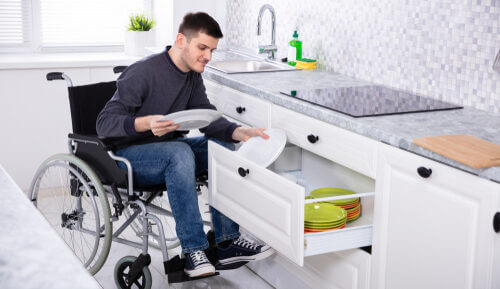If you are due to be discharged from hospital in the UK, you may not realise that you may be entitled to up to 6 weeks free care after hospital. This is also known as free reablement care or free intermediate care. This article highlights free post-hospital care and how to find the right short-term after-hospital care to get back to health.

Page contents
- What is the six weeks of free care scheme?
- What does the Care Act say about 6 weeks free care?
- Who is eligible for 6 weeks of free care after hospital?
- What type of post-hospital care can you receive?
- What is intermediate care?
- What is reablement care?
- Does the free care after hospital always last 6 weeks?
- What happens after the 6 weeks of care?
- Who pays for care in a care home on discharge from hospital?
- How do I arrange my own home care after hospital discharge?
- How can I get care after hospital stay in UK?
Page contents
- What is the six weeks of free care scheme?
- What does the Care Act say about 6 weeks free care?
- Who is eligible for 6 weeks of free care after hospital?
- What type of post-hospital care can you receive?
- What is intermediate care?
- What is reablement care?
- Does the free care after hospital always last 6 weeks?
- What happens after the 6 weeks of care?
- Who pays for care in a care home on discharge from hospital?
- How do I arrange my own home care after hospital discharge?
- How can I get care after hospital stay in UK?
What is the six weeks of free care scheme?
You may need extra help to get back to health after a discharge from hospital in the UK. This may involve home care visits to help you get out of bed, dressed and washed, wound care, and support to help you eat or manage your medication.
The NHS and local councils in England, Scotland, Wales and Northern Ireland often provide short-term, free reablement care also known as intermediate care for up to six weeks after hospital discharge.
This temporary support is designed to help you:
- Regain independence and confidence at home.
- Recover from illness or surgery.
- Prevent unnecessary readmission to hospital.
This type of after hospital care for the elderly and others can be beneficial when it comes to getting back to health.
Depending on your needs, care might take place in your own home, a rehabilitation unit, or a care home that offers short-term or respite stays.
What does the Care Act say about 6 weeks free care?
The Care Act (2014) guidance was updated to state ‘The regulations require that intermediate care and reablement provided up to 6 weeks, and minor aids and adaptations up to the value of £1,000 must always be provided free of charge.’
Who is eligible for 6 weeks of free care after hospital?
You are not automatically entitled to 6 weeks free care after a hospital stay.
Eligibility for free post-hospital care depends on your individual circumstances, but generally you may qualify if:
- You’ve been in hospital and need help to return home safely.
- You’re not yet ready to manage everyday tasks independently.
- Your needs are expected to improve with short-term support.
You or you family can speak to hospital staff about how best to meet your care needs after you leave hospital.
Your hospital discharge team will assess your situation and help arrange the right care plan for you.
Staff will assess your potential to regain independence with support.
What type of post-hospital care can you receive?
Six weeks of care after a hospital stay can make a huge difference in recovery by helping people regain independence and ease the transition from hospital to home.
The support offered through the six-week scheme can include:
- Help with washing, dressing and meal preparation.
- Physiotherapy or occupational therapy.
- Medication management and wound care.
- Mobility support and home adaptations.
- Emotional support and wellbeing checks.
Some care homes provide specialist reablement programmes that combine expert nursing care with rehabilitation services to help residents recover quickly and safely.
The free care might include:
- a nurse.
- an occupational therapist.
- a physiotherapist.
- a speech and language therapist.
- doctors.
- care staff.
What is intermediate care?
- Intermediate care is a type of short-term support that aims to help you be as independent as possible.
- It can be provided in a community hospital, care home or your own home.
- Before you leave the hospital, staff consider if you’d benefit from intermediate care services. If this is the case, staff set goals with you, which you’ll receive support to reach.
- An example of intermediate care may involve health staff such as physiotherapists or care staff helping you to relearn skills you may have lost.
What is reablement care?
- Reablement is a form of intermediate care focusing on helping you to learn or re-learn skills necessary for daily living.
- In relation to free reablement care, care staff can support you at home by guiding you to complete tasks such as washing, dressing and preparing a snack for yourself, rather than doing these tasks for you.
- The aim is to help rebuild your skills, improve your mobility and help rebuild your skills and confidence.
- If you’re eligible, you’ll receive up to six weeks of reablement care after hospital.
Does the free care after hospital always last 6 weeks?
While you may be entitled to 6 weeks of free care, how many weeks of post-hospital care that you receive depends on how quickly you recover.
For example, some individuals may only need two weeks of rehabilitation.
What happens after the 6 weeks of care?
- Staff will review your progress. In some cases, care may continue beyond six weeks, but you might then be means-tested or self-funding.
- Any care after this set period will require you to contact your local authority for a care needs assessment. This will assess what your care needs are, what support is suitable for you e.g. adaptations to your home.
- Your local authority will undertake a financial assessment to determine how much of your care it will pay for and how much of your care you must pay for yourself.
Who pays for care in a care home on discharge from hospital?
- If you still need care and support while you recover from a stay in hospital, but no longer need hospital care, you may be discharged to a care home. This is called convalescence or respite care.
- Your local authority will undertake a care needs assessment to determine what your care needs are. They will also undertake a financial assessment to understand if it can contribute towards the cost of your care.
- You receive state funding for a care home stay if your capital and assets fall below a certain threshold. In this case your local authority will pay for some or all of your care. Find out more about paying for care.
- If you are on a Discharge to Assess pathway (England), a stay in a care home will likely be funded for you.
- You may need to pay for your stay in a care home after a stay in hospital, unless you are eligible for state funding or for NHS Continuing Healthcare Funding. (NHS CHC). NHS CHC means the NHS pays for your care.
- This applies for people living in England, Wales and Northern Ireland who are assessed as having a ‘primary health need’, which could be rapidly deteriorating health, a complex condition or a terminal illness.
- If you are in Scotland, your personal and nursing care should be free. You will still need to pay for your accommodation at the care home.
How do I arrange my own home care after hospital discharge?
If you have eligible needs but aren’t eligible for financial support, you’ll have to arrange your own services.
Even if you’re not assessed as being eligible for help, you can still arrange your own home care.
How can I get care after hospital stay in UK?
If you or someone you know is about to be discharged from hospital and need short-term or respite care, you can:
- Search for home care on homecare.co.uk or care homes offering short-term or reablement stays near you.
- Compare reviews, ratings and fees and contact care providers directly to check availability and arrange visits on carehome.co.uk which has thousands of listings and verified reviews.
Search for a home care provider
What is the six weeks of free care scheme and who is eligible?
You may need extra help to get back to health after a discharge from hospital in the UK. This may include home care visits to help you get out of bed, dressed and washed, wound care, and support to help you eat or manage your medication.
The NHS and local councils in England, Scotland, Wales and Northern Ireland often provide short-term, free reablement care also known as intermediate care for up to six weeks after hospital discharge.
This temporary support is designed to help you regain independence and confidence at home, recover from illness or surgery and prevent unnecessary readmission to hospital.
This care might take place in your own home, a rehabilitation unit, or a care home that offers short-term or respite stays.
What happens after 6 weeks of free care?
After 6 weeks of free care, staff will review your progress in acheiving health goals. In some cases, post-hospital care may continue beyond six weeks, but you might then be means-tested or self-funding. Any care after the initial 6 weeks will require you to contact your local authority for a care needs assessment. This will assess what your care needs are, what support is suitable for you e.g. adaptations to your home.
How can I get care after hospital stay in UK?
If you or someone you know is about to be discharged from hospital and need short-term or respite care, you can:
Compare reviews, ratings and fees of care providers and search for them on homecare.co.uk or care homes offering short-term/ reablement stays near you on carehome.co.uk.


